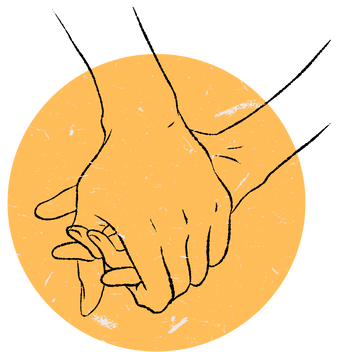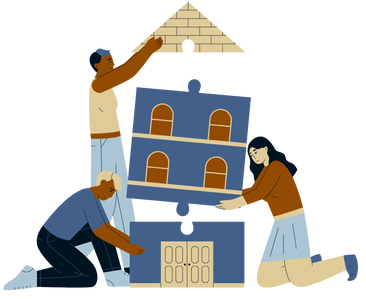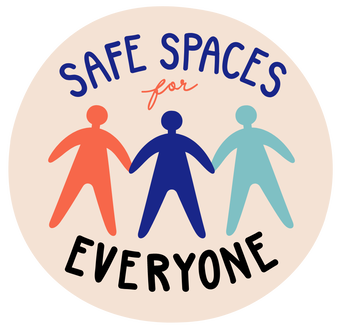White Paper: Breaking Through and Restoring Sanctuary
 source: canva
source: canva
In 2019, Breelove Counselling Inc. and Crossroads for Women began discussions about trauma informed mental health interventions and practice challenges within community organizations, in this case, most specifically, within shelters serving women and children in the Greater Moncton Area. These discussions expanded to form a partnership and support from Women’s Equality; in the form of a grant. Bringing in a motivated and passionate team of interventionists and shelter workers, with dedicated licensed counselling therapists, with a specialization in trauma, childhood adversities, and art therapy. The aim was to seek ways of breaking through the challenges shelters face in providing adequate mental health services and helping women and children experiencing homelessness to restore their own sanctuary: Breaking Through and Restoring Sanctuary.
Breaking Through and Restoring Sanctuary project is a III phase project. Phase I proposes a new paradigm for women’s shelter operations, focusing on trauma informed care and mental health services. The focus on practices and services for mental health services at the shelter level proposes transitioning from traditional crisis response by adding deliberate interventions that include the broader goal of preventing and ending violence, through trauma informed care and housing focused objectives embedded in the operations of the shelter.
Breaking Through and Restoring Sanctuary proposes a humanistic definition of violence and the intentional recommendations for program administrators towards the implementation of mental health services within their organization (for shelter clients and staff).
To develop Breaking Through and Restoring Sanctuary, we undertook a review of literature and evidence based studies encompassing shelter services for women fleeing violence, effects of acute and/ chronic exposure to trauma, the effects of childhood adversities, and the impact of adequate and trauma informed roles for staff and professionals working with individuals seeking shelter. The purpose of these literature and evidence based study reviews, is to understand opportunities for shelters within the broader violence prevention movement. In addition, we consulted with experts in the field, both organizations and individuals with lived experience. Crossroads for Women went through a brief review and assessment.
Our white paper aims to foster reflection and direction through which we can begin to develop evidence based prototypes for mental health services shelter models, in both phase II and III; could be replicated in other shelters with similar challenges.
The authors believe, status quo is not an option and encourages individuals with lived experience, advocates, policy makers and practitioners to challenge, build and further refine Breaking Through and Restoring Sanctuary possibilities.
Breaking Through and Restoring Sanctuary project is an affirmation of the changes organizations and the sector are currently undergoing, including an emerging focus on trauma informed care, in-depth understanding of childhood adversities, and our need to enhance services for diverse populations, specifically to address mental health and overall well-being in individuals and groups.
Breaking Through and Restoring Sanctuary project is a III phase project. Phase I proposes a new paradigm for women’s shelter operations, focusing on trauma informed care and mental health services. The focus on practices and services for mental health services at the shelter level proposes transitioning from traditional crisis response by adding deliberate interventions that include the broader goal of preventing and ending violence, through trauma informed care and housing focused objectives embedded in the operations of the shelter.
Breaking Through and Restoring Sanctuary proposes a humanistic definition of violence and the intentional recommendations for program administrators towards the implementation of mental health services within their organization (for shelter clients and staff).
To develop Breaking Through and Restoring Sanctuary, we undertook a review of literature and evidence based studies encompassing shelter services for women fleeing violence, effects of acute and/ chronic exposure to trauma, the effects of childhood adversities, and the impact of adequate and trauma informed roles for staff and professionals working with individuals seeking shelter. The purpose of these literature and evidence based study reviews, is to understand opportunities for shelters within the broader violence prevention movement. In addition, we consulted with experts in the field, both organizations and individuals with lived experience. Crossroads for Women went through a brief review and assessment.
Our white paper aims to foster reflection and direction through which we can begin to develop evidence based prototypes for mental health services shelter models, in both phase II and III; could be replicated in other shelters with similar challenges.
The authors believe, status quo is not an option and encourages individuals with lived experience, advocates, policy makers and practitioners to challenge, build and further refine Breaking Through and Restoring Sanctuary possibilities.
Breaking Through and Restoring Sanctuary project is an affirmation of the changes organizations and the sector are currently undergoing, including an emerging focus on trauma informed care, in-depth understanding of childhood adversities, and our need to enhance services for diverse populations, specifically to address mental health and overall well-being in individuals and groups.
The Community Mental Health and Recovery Services
 source: canva
source: canva
As a result of our findings in our white paper, and the pilot of Phase II, Restoring Sanctuary mental health educational mini series. We’ve been able to provide a strong road map and foundation in the integration of mental health services within shelters.
This special project is in line with our Phase III, the replication of these services in other shelters with similar challenges. This opportunity has come at the right time.
We are grateful that this program was financed in full by a grant from the New Brunswick Department of Health.
When working within the homeless population, the issues they face are complex and their cases can be difficult to navigate if you are unprepared or do not possess the competencies required to provide adequate care to individuals.
For individuals who have lived in constant adversities and crises of housing, health care, drug use, criminal justice constraints, financial needs, and violence, providing comprehensive, integrative care can seem an impossible task. For this reason, it is important to keep treatment and prevention goals realistic and achievable, relatively short term, meeting individuals where they are at.
Individuals who have experienced overwhelming adversities, such as traumatic experiences, neglect, or various forms of abuse and losses, often are at a higher risk of developing mental illnesses, unhealthy coping strategies such as substance use, over-eating, under-eating, and subsequent loss of housing and relationships.
Recovery is a process of change through which an individual improves their health and wellness, lives a self-directed life, and strives to reach their full potential. Although our safety and recovery approaches can be relevant to some, it is important to reflect and have an overall view of how homelessness, substance abuse, trauma, and other adversities can interact and hinder recovery.
Our services explore the process of implementing a trauma informed model which promotes the belief of recovery within the individual.
This special project is in line with our Phase III, the replication of these services in other shelters with similar challenges. This opportunity has come at the right time.
We are grateful that this program was financed in full by a grant from the New Brunswick Department of Health.
When working within the homeless population, the issues they face are complex and their cases can be difficult to navigate if you are unprepared or do not possess the competencies required to provide adequate care to individuals.
For individuals who have lived in constant adversities and crises of housing, health care, drug use, criminal justice constraints, financial needs, and violence, providing comprehensive, integrative care can seem an impossible task. For this reason, it is important to keep treatment and prevention goals realistic and achievable, relatively short term, meeting individuals where they are at.
Individuals who have experienced overwhelming adversities, such as traumatic experiences, neglect, or various forms of abuse and losses, often are at a higher risk of developing mental illnesses, unhealthy coping strategies such as substance use, over-eating, under-eating, and subsequent loss of housing and relationships.
Recovery is a process of change through which an individual improves their health and wellness, lives a self-directed life, and strives to reach their full potential. Although our safety and recovery approaches can be relevant to some, it is important to reflect and have an overall view of how homelessness, substance abuse, trauma, and other adversities can interact and hinder recovery.
Our services explore the process of implementing a trauma informed model which promotes the belief of recovery within the individual.
 source: canva
source: canva
One of our goals is to help move the individual from a state of homelessness and poor mental health, to housed and mentally well, beginning with the objective of safety and regulation. The operational goal is to help build resilience and manageable role expectations for contractual staff.
Within our partnership with The Humanity Project, our focus is trauma-informed community building, while clinically, implementing a trauma recovery model. This model will work in collaboration with our other community services in order to help reduce silos and increase smooth integration and flow between program services and partnerships.
Our framework reflects three pillars, in helping individuals overcome dysregulation, this helps in achieving safety and stability.
The goal is to create a safe and stable “life in the here and now”, helping individuals to find the space to safely remember the trauma, rather than continue to relive it.
Helping individuals come to terms with some of their most adverse and traumatic experiences, while transitioning into a space of new meaning and growth.
The framework includes various models such as art therapy, trauma-informed yoga and meditation, EMDR, Brainspotting, Groups, and our Safety and Recovery Protocols. We work at integrating evidence based modalities that have high recovery rates for this specific population.
When you address trauma, you help within a community to de-escalate chaos and stress, you help foster resiliency, strengthen social connection, and most importantly, we help to recognize trauma for recovery.
The outcomes are the foundation and support for effective delivery of programs and services and the creation of conditions for long-term community and individual change.
Given that trauma is the foundation for most adversities within communities (poverty, homelessness, violence, exacerbated use of the medical system), using a trauma-informed and trauma recovery approach to our services is empirical.
Once you address the root cause of the sufferance and pain, you provide space for new meaning making, growth, healing, recovery, and re-integration.
We look forward in delivering this project, succeeding at our goals in supporting individuals into safety and regulation and most importantly, showing our community how people helping people can make a difference!
Within our partnership with The Humanity Project, our focus is trauma-informed community building, while clinically, implementing a trauma recovery model. This model will work in collaboration with our other community services in order to help reduce silos and increase smooth integration and flow between program services and partnerships.
Our framework reflects three pillars, in helping individuals overcome dysregulation, this helps in achieving safety and stability.
The goal is to create a safe and stable “life in the here and now”, helping individuals to find the space to safely remember the trauma, rather than continue to relive it.
Helping individuals come to terms with some of their most adverse and traumatic experiences, while transitioning into a space of new meaning and growth.
The framework includes various models such as art therapy, trauma-informed yoga and meditation, EMDR, Brainspotting, Groups, and our Safety and Recovery Protocols. We work at integrating evidence based modalities that have high recovery rates for this specific population.
When you address trauma, you help within a community to de-escalate chaos and stress, you help foster resiliency, strengthen social connection, and most importantly, we help to recognize trauma for recovery.
The outcomes are the foundation and support for effective delivery of programs and services and the creation of conditions for long-term community and individual change.
Given that trauma is the foundation for most adversities within communities (poverty, homelessness, violence, exacerbated use of the medical system), using a trauma-informed and trauma recovery approach to our services is empirical.
Once you address the root cause of the sufferance and pain, you provide space for new meaning making, growth, healing, recovery, and re-integration.
We look forward in delivering this project, succeeding at our goals in supporting individuals into safety and regulation and most importantly, showing our community how people helping people can make a difference!
Are you a service provider in the greater Moncton area working within the homeless population?
Our Team
Denise Ouellette
Registered Social Worker | Bilingual
Registered Social Worker | Bilingual
|
Denise has been a registered social worker since 2007. She received her bachelor's degree from Université de Moncton. She has been working in the health field ever since.
Denise has a variety of professional, community and personal experiences. In her work, she mainly helps people find solutions to difficult situations, find tools, find resources, offer support, and do crisis intervention. Denise is a single mother of 3 children who is involved in her community. She has been involved as a volunteer with the CAFI (centre for francophone immigrants), Earth Day Moncton, Humanity Project as well as Needle Awareness. Denise will be responsible for the needs assessments of the people who will be served by Breelove Wellness. She will be able to answer questions and refer people with needs to other organizations when needed and will be available to offer support in the short term. |
Greg Gibson
Practicum Graduate Student
Practicum Graduate Student
|
Greg is currently completing his Master of Counselling Psychology at Yorkville University, and previously completed a Bachelor of Science (Major in Psychology) at Dalhousie University.
Greg uses a person-centered humanistic approach that draws from personal experience and volunteer work. He plans to specialize in addiction counselling post-internship using a variety of therapeutic methods including solution-focused therapy and Dialectical Behaviour Therapy (DBT). Greg hopes to provide a safe, warm, and healing therapeutic environment built on honesty and trust. “Honesty, open-mindedness, and willingness are indispensable in the path to healing” - Greg |
|
Vanessa Gray
Practicum Graduate Student Vanessa is currently completing her Master of Counselling Psychology at Yorkville University, under clinical supervision with Kayla Breelove Carter and holds a Bachelor of Science (Major in Psychology) from Dalhousie University. Vanessa has a background working with adults experiencing mental health and addiction barriers in the non-profit sector. Working from a client-centered approach she aims to collaborate in a non-judgemental and empathetic way to help empower her clients. "It can be empowering process to take control of your mental health, and I am honoured to collaborate with you on this journey” - Vanessa |
|
Cristin Donovan
Peer Support Worker Cristin is a Registered Holistic Nutritionist and a qualifying Doula. Her passion and focus is on plant-based nutrition, women's health and mental health through nutrition. Concentrating on the person as a whole; body, mind and spirit. She helps her clients uncover the root cause of their health concerns and provides preventative health strategies through diet and lifestyle changes. Educating and empowering her clients throughout their health journey. Her empathetic and caring nature will help you feel at ease throughout the process. "Making the connection between our gut and brain is an important step towards healing our bodies and our minds" - Cristin |
|
Devin Hudson
Peer Support Worker Devin is a Certified Peer Support Worker. He has taken a peer support course that is offered at Salvus Clinic. He has over 10 years of lived in experience In addiction and mental health. He brings understanding and acceptance to his clients and peers. "If you can help one person do one thing then today was a total success" - Devin. |
|
Michael Fogarty
Peer Support Worker Michael is a Certified Peer Support Worker through CMHA (Canadian Mental Health Association) and Université de Moncton. Michael is ready to share his personal lived experience with mental illness and addiction with his peers in order to build a trustworthy bond and help his peers know they are not alone and show there is hope and light at the end of the tunnel. Michael is ready to help his peers find their path to lifelong recovery by using their personal strengths and resources in our community. “Be happy for this moment. This moment is your life” - Michael |
|
Andrew Raven
Peer Support Worker Andrew is a Peer Health Navigator/ Peer support and brings over 20 years of lived experience to our team. He has overcome his own battles with addiction, mental health and homelessness and use his experiences to help others in/with similar situations overcome their struggles. With completed training in Peer support, Crisis Prevention Intervention, Non Violent Intervention, Concurrent disorders, and Trauma informed care, Andrew brings a unique perspective of lived experiences and training to our organization. "What you get by achieving your goals is not as important as what you become by achieving your goals." - Andrew |
|
Shayna Hamilton
Peer Support Worker Shayna is a peer support worker with Breelove Wellness. She is a mother of three and currently engaged. She has overcome her own battles with substance abuse and is able to use her experiences to bring acceptance and understanding to her clients. Shayna is looking forward to giving back to the community and making a change, she has a heart for the lost and the broken seeing as she was there at one point. "When I find myself lost for words my music speaks" - Shayna |










